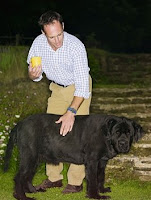 We all know that a lot of people own dogs, but exactly how many of us, and why? And perhaps more to the point, what do we do with them? Many of the answers may appear to be self evident, but no-one before has attempted to quantify such information – and yet it is important sociologically, it has implications for dog health, welfare and behaviour, and it is also important in terms of both the health of dogs and their owners.
We all know that a lot of people own dogs, but exactly how many of us, and why? And perhaps more to the point, what do we do with them? Many of the answers may appear to be self evident, but no-one before has attempted to quantify such information – and yet it is important sociologically, it has implications for dog health, welfare and behaviour, and it is also important in terms of both the health of dogs and their owners.
A recent study by the University of Liverpool has looked in depth at dog ownership in a small, semi-rural community in Cheshire, which has a variety of housing types, and also fields and country parks where dogs can be exercised. Over 1,200 households were approached, and information collected by a combination of interviews and questionnaires. Approximately 50% of households owned a pet of some sort, and 1 in 4 owned a dog - so clearly pets in general, and perhaps dogs in particular, are very important to us.
The households most likely to own dogs were families with school-age children, and interestingly those with an adult woman in the house. In contrast, families with very young children, and, more surprisingly perhaps retired people, were less likely to have a dog. Gundogs were the most popular type, followed by cross breeds, but Labradors were the most popular individual breed, perhaps fitting in with the view that they tend to make good family pets.
 The researchers then questioned householders in some detail as to what they did with their dogs, both inside and outside the home. The majority of dogs were allowed to roam throughout the house when their owner was present, but were confined at night or when the owner was out. The commonest place for the dog to sleep was the kitchen, but 1 in 5 slept on the bedroom floor, and 1 in 7 slept on a human bed, indicating the very close physical and psychological bond between some dogs and their owners. Approximately half of dogs were reported to lie on furniture, and a similar proportion enjoyed regular cuddles on a person’s lap, but smaller dogs and younger dogs were more likely to do this. A variety of games were played with dogs, but the most popular game was to fetch a ball or other object, with smaller dogs more likely to play ‘tug-of war’:
The researchers then questioned householders in some detail as to what they did with their dogs, both inside and outside the home. The majority of dogs were allowed to roam throughout the house when their owner was present, but were confined at night or when the owner was out. The commonest place for the dog to sleep was the kitchen, but 1 in 5 slept on the bedroom floor, and 1 in 7 slept on a human bed, indicating the very close physical and psychological bond between some dogs and their owners. Approximately half of dogs were reported to lie on furniture, and a similar proportion enjoyed regular cuddles on a person’s lap, but smaller dogs and younger dogs were more likely to do this. A variety of games were played with dogs, but the most popular game was to fetch a ball or other object, with smaller dogs more likely to play ‘tug-of war’:
The majority of dogs were fed in the kitchen, and the most popular food was dry complete dog food. A surprising number (85%) received commercial dog ‘treats’, and most dogs were given human food titbits, generally from the hand, or in their bowl – although 11% were given these direct from the human plate.
Outside, most dogs were confined to a secure area and never roamed – only 1% were allowed to roam free. About a third of dogs were walked twice a day, and a third once a day; only a very small number were never walked at all. Over 80% of owners reported that they always picked up dog faeces when they were out walking in urban areas or parks, but only 50% did so when in the countryside – and significantly fewer male owners reported picking up faeces than did females. The researchers also obtained information on where the dogs were walked, and how many people they interacted with apart from their owners, both inside and outside the home.
This investigation, funded by DEFRA, has provided a wealth of data on what exactly we do with our dogs. Not only is this important in terms of the dogs’ health and welfare, but also the health and welfare of their owners. Although there are few dog diseases that can be transmitted to humans, and such events are in any case relatively uncommon, information on how we interact with our dogs may be crucial to know, should any more virulent diseases emerge. Overall however, we are far more likely to catch diseases from fellow humans than from dogs, and dogs are known to provide us with considerable psychological and health benefits.
Source: http://www.dogmagazine.net/archives/497/what-are-dog-owners-doing-with-their-dogs/
 Every pet lover dreamed of having the best pet for themselves. Most of us go to the petshop to get those, but did you know that some of the best pets came from the shelters?
Every pet lover dreamed of having the best pet for themselves. Most of us go to the petshop to get those, but did you know that some of the best pets came from the shelters?




